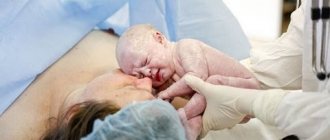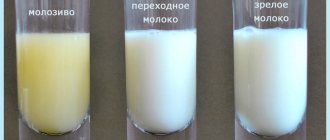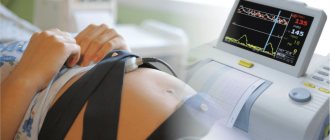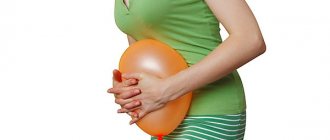When do the first periods appear after childbirth, when does the cycle become regular, what deviations are possible and how to prevent their occurrence.
Excessive anxiety for a woman who has recently given birth is harmful, but it is necessary to know what phenomena indicate the presence of pathology in order to consult a doctor in a timely manner. Therefore, you should study this topic and consider important features.
Why are there no periods after childbirth?
Some women believe that the cycle will be restored immediately after the birth of the child. But that's not true. There will be no menstruation for a certain period of time, and this is natural. A new mother experiences lochia, which is what postpartum discharge is called. But these are not menstruation, although they resemble them in their color.
Lochia is a uterine discharge that is associated with the body’s need to reject all traces of a past pregnancy. Over the course of several weeks, remnants of the endometrium, placenta and other waste products of the fetus emerge from the uterus.
At first, the color of the lochia is deep red, but gradually these discharges become darker and their quantity decreases. After about 1.5 months, the lochia should stop. This is because the inner layer of the uterus has returned to normal.
However, there will be no menstruation for some time.
The absence of menstruation in the postpartum period is due to hormonal changes in the woman’s body. In order for her to breastfeed, a large amount of prolactin is released into the blood. This hormone interferes with the functioning of the ovaries, so eggs are not produced and the endometrium does not form. Accordingly, menstruation does not appear.
When does your period start after childbirth?
It is difficult to name the exact time when the first menstruation appears after childbirth. This is influenced by many factors (diseases, individual properties of the body, hormonal levels, etc.). Although in general, periods depend on how complete breastfeeding is.
You should focus on such circumstances as:
The presence or absence of complementary foods . If the baby is exclusively breastfed, menstruation does not appear until the baby is weaned. But a year after the baby is born, periods may appear regardless of whether breastfeeding continues.
Amount of milk . If there is a shortage of milk, a woman has to use formula milk. At the same time, the production of prolactin decreases, which allows the ovaries to start working. In such a situation, periods may appear after 4-5 months. So there is absolutely no need to worry here.
Choosing artificial feeding . Some mothers cannot or do not want to breastfeed their baby. In this case, periods after childbirth begin much earlier - after about 2 months.
Features of childbirth . If the baby was born via cesarean section, the onset of the mother's menstruation depends on the type of feeding. When breastfeeding, there are no periods until the baby begins to be fed.
The period when menstruation should begin after childbirth is influenced by the following features:
- Following a daily routine
- Woman's age
- Emotional condition.
Therefore, even a doctor cannot provide accurate information.
How long does your period last after childbirth?
Often, after the birth of their first child, women talk about the elimination of discomfort during menstruation and the regularity of their cycle. But it’s worth drawing conclusions only 3 months after their first appearance.
Before this, the cycle may vary, and the menstrual periods themselves sometimes occur unusually (with shorter or longer duration, excessive abundance or scanty discharge). This is considered normal, although consultation with a doctor is still necessary.
This will ensure that there are no pathologies.
The normal frequency of menstruation is 21-34 days with a duration of 3-8 days. The volume of discharge should not be less than 20 ml or more than 80 ml. The duration of the first postpartum menstruation does not matter (if the indicators are normal), it is important that they become regular within 3 months.

Some women experience changes in the characteristics of the premenstrual period. They notice an increase in PMS symptoms, which may bother them. This is usually due to hormonal changes in the body. It is difficult to neutralize this feature; most often you have to come to terms with it. But its appearance does not mean that there are problems in the body.
When you need medical help
After giving birth to a child, a woman should not forget about her health. You need to go to the doctor to assess the condition of the internal organs and make sure there are no pathologies. You need to urgently contact a specialist in situations such as:
- The first menstruation is too heavy. If pads need to be changed more than once every 2 hours, this indicates bleeding. Also, a large amount of discharge can be caused by endometriosis, endometrial hyperplasia, and hormonal imbalances.
- The appearance of bloody discharge with an unpleasant odor after the lochia has stopped. This means that there are remnants of the fertilized egg in the uterus.
- Poor or absent discharge for 3 months after completion of breastfeeding. This happens when there is an increased level of prolactin in the body, although its amount should decrease by this time.
- The presence of an unpleasant odor in menstrual discharge. If the blood released has a dark tint, and the woman suffers severe pain, this may indicate the presence of disorders in the body.
- Irregularity of the cycle 3 months after the start of menstruation. This is also a sign of pathology associated with the hormonal system.
In all these cases, a visit to the gynecologist should not be delayed. It is worth addressing violations at their first manifestations, since the situation may worsen further.
Do I need to protect myself?

Theoretically, this is true, since the ovaries do not function, eggs are not produced, and therefore pregnancy cannot occur. But there are many cases when pregnancy did occur, and its presence was discovered only in the later stages. The reason for this is the lack of accurate information about the beginning of menstruation. It is not known when the amount of prolactin produced will decrease; one can only guess about this.
Ovulation occurs 2 weeks before menstruation.
Therefore, with unprotected intercourse, a woman can become pregnant again, and the absence of menstruation will be explained by hormonal changes associated with breastfeeding (especially if it has not been stopped).
This means that even during lactation it is necessary to protect yourself. If a couple wants to have a second child, this does not have to be done, although doctors recommend waiting about two years for the female body to fully recover after childbirth.
Why there are failures
For the first three months from the start of menstruation, you should not worry about their irregularity. But if menstrual irregularities persist even after this, you should consult a doctor. This is especially important if additional adverse symptoms are observed. The causes of menstrual irregularities can be different. This:
- Sheehan's syndrome (postpartum hypopituitarism). This pathology can be caused by peritonitis, sepsis or heavy postpartum bleeding. It can also be caused by histoses. The result of the disease may be the absence of menstruation or their scarcity, which is associated with necrotic changes in the pituitary gland. Additional symptoms of the syndrome are increased fatigue, headache, swelling, and hypotension.
- Hyperprolactinemia. The absence of menstruation in this case is due to disturbances in the functioning of the thyroid gland or the presence of a pituitary adenoma.
Read also…. Signs and sensations of ovulation in a woman
Both pathologies can be cured, but to do this you need to consult a specialist.
Should I continue breastfeeding after my period starts?
Breast milk is the healthiest food for a baby. If a child is breastfed, this significantly reduces the risk of developing infectious diseases. But after the start of menstruation, many women do not know whether to continue breastfeeding their baby, doubting its benefits.

The presence of menstruation does not affect the quality of milk, so you should not give up breastfeeding . But you need to take into account some circumstances:
- As lactation continues, the period of normalization of the cycle may be delayed.
- During menstruation, the sensitivity of the nipples increases, which makes feeding unpleasant for the woman.
- Milk is secreted in smaller quantities during menstrual periods, so the child may become nervous. This problem can be solved by placing the baby on one or the other breast alternately.
These features may cause discomfort. But there is no need to doubt the benefits of breastfeeding at this time - it can and even should be continued.
Hygiene features
It is very important to maintain good hygiene during the postpartum period. The female body at this time requires careful care, since it has not yet recovered from stressful circumstances for it.
The main recommendations are as follows:
- Until the menstrual cycle has resumed, you should not use tampons and pads with absorbent mesh . They are also not suitable for lochia. The optimal hygiene product in this case is pads with a smooth surface. They should be changed every 3-4 hours.
- At this time, the genitals need to be washed more often to prevent infections. It is not advisable to use intimate hygiene gels or scented soaps. These products should be replaced with baby soap.
- You must abstain from sexual activity for at least 6 weeks. After resuming sexual activity, it is necessary to use barrier contraception - this will help avoid pregnancy and infection in the uterus.
The onset of menstruation after the birth of a child is an individual phenomenon, which is influenced by many circumstances. The woman herself cannot influence this, but she can take care of her body in order to prevent the development of postpartum complications.
Most women know that the presence of menstrual bleeding indicates the health of the female reproductive system. Normally, the main reasons for its absence are pregnancy and menopause. However, there is also a short respite provided to the fair sex by nature - this is the absence of menstruation after childbirth.
. In this article we will talk about why there are no periods after childbirth.
Why no periods after childbirth - when will periods come after childbirth
All women who have gone through childbirth sooner or later ask the following question: “Why are there no periods after childbirth, and when will they come?” But really, when should the monthly cycle begin and return to normal?
When should menstruation begin after childbirth?
It is not possible to give a definite answer; for each girl, the process of restoring menstruation occurs individually, for some it will take two months, and for others, two years. Many girls mistake the discharge that immediately begins for menstruation. But this is not true at all.
This bleeding does not belong to menstruation, and is called lochia. They are released from the uterus, or rather from its wound. During childbirth, the placenta separates from the wall of the uterus, and a wound forms in the place of the placenta. This wound bleeds heavily in the first days, but as it heals, the discharge becomes less and its appearance changes.
Lochia begins to appear immediately after birth and ends after 6 weeks or 8.
On average, girls who breastfeed their children begin their periods 14 to 16 months after giving birth. In the first six months after childbirth, menstruation occurs in 7% of girls. After 7 - 12 months, 37% of girls get their period. After one year and up to 24 months, menstruation begins in 48% of girls. And 2 years after giving birth, menstruation begins in 8% of girls.
For those mothers who do not breastfeed, menstruation returns after 10 or 15 weeks. In most cases, the cycle initially becomes regular. But it is possible that at first there will be a delay or, on the contrary, your period will come ahead of schedule. In this case, everything should be settled after 2 - 3 cycles.
Why don't you have periods while breastfeeding?
The restoration of menstruation is a hormonal process in a girl’s body and it depends on how quickly the body’s hormonal levels are restored after childbirth. And the way breastfeeding occurs plays an important role in restoring hormonal levels. The restoration of menstruation does not depend on how the baby was born: by caesarean section or naturally.
Nursing mothers may experience lactational amenorrhea, i.e. no menstruation after 6 months, a year or a longer period. There is no need to worry and think why there is no period, this delay occurs physiologically.
If from the very birth of the child the mother feeds him with both formula and breastfeeding, then menstruation will come within 6 months. If the baby eats only breast milk and drinks it on demand at any time, then menstruation can begin 2 years after birth, after the complete completion of lactation.
If complementary foods are introduced into the child’s diet and he begins to breastfeed less actively, then menstruation may come even before the end of lactation.
During menstruation, many mothers notice that the amount of breast milk decreases. Don't worry, as soon as your period is over, your milk volume will return to normal. And while they are walking, it is advisable to put the baby to the breast more often.
Many mothers believe that it is impossible to get pregnant during amenorrhea. This is not true; conception can occur even with such a delay. It is better to go to a gynecologist and he will select a contraceptive method that will not harm the baby and protect against unwanted pregnancy.
Other factors
In addition to breastfeeding, the following factors also influence when your period comes after childbirth:
- Mommy's daily routine.
- Her food. It should be complete and nutritious.
- Dream. In addition to sleeping at night, you need to rest during the day.
- Psychological condition. There should be no stress or nervous tension.
- Illness or complications that began after childbirth. It is advisable to identify and treat them in a timely manner. Read more about complications after childbirth →
What are periods after childbirth?
When your period arrives after childbirth, you will notice that it is slightly different from the period you had before giving birth. If a girl’s periods were irregular before giving birth, then after giving birth they will become more regular, without delay.
On average, the menstrual cycle lasts 28 days, but it can vary from 21 to 35 days. Menstruation lasts from 3 to 6 days, sometimes it can reach 8 days. Pain during menstruation also decreases.
And your periods can be either less or more abundant. The largest volume of blood during menstruation is released on days 1 and 2.
Until your cycle is restored, you should avoid tampons and pads that have an absorbent mesh surface.
When to see a doctor
You should immediately consult a doctor in the following cases:
- When after completion of lactation 2 months later there is a delay in menstruation.
- When severe pain is felt in the uterine area.
- When there are large clots in the blood or the color of the discharge is bright red.
- When menstruation is accompanied by a pungent odor.
- When heavy and prolonged discharge lasts more than 7 days.
If you don’t have your period even a year after giving birth, you shouldn’t panic and be nervous. It is better to come for an examination to a gynecologist, and identify the reasons why there is a delay, and begin to eliminate them. If there are no problems, you can calmly wait for the onset of the menstrual cycle and enjoy motherhood.
about why periods disappear
We recommend reading: Which babies are considered premature, what are the causes of prematurity, how to care for, vaccinate and care for a premature baby
Source: https://moirody.ru/posle/net-mesyachnyx-posle-rodov.html
Reasons for missing periods after childbirth
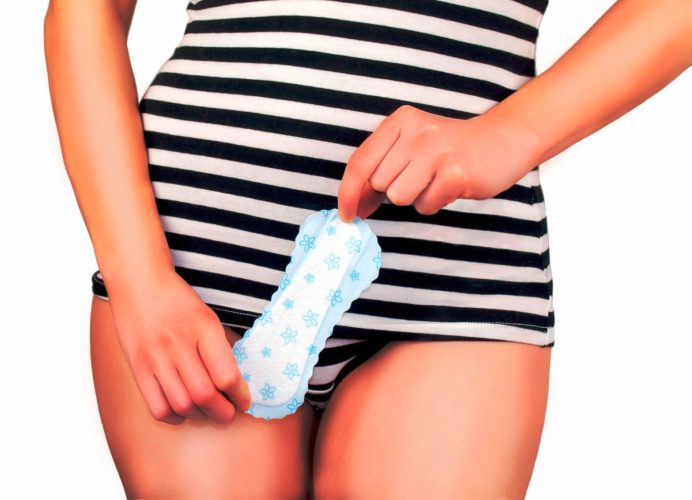
Many people mistake postpartum discharge - lochia - for the beginning of menstruation. However, with these discharges, ovulation does not occur, as the body recovers after childbirth. Pregnancy and childbirth are a great stress for him, because during the period of bearing a baby, significant changes occur and the load on a woman’s internal organs increases.
The first reason is the recovery period, which takes from six to eight weeks, regardless of how the pregnancy progressed and how the birth took place. But since during pregnancy major changes also occurred with hormonal levels, complete recovery will require a little more time - from ten to twelve weeks.
The second important reason for the absence of menstruation after childbirth is the period of breastfeeding the baby. This period has a special name – “lactation amenorrhea”. This condition is associated with high levels of the hormone prolactin, which is responsible for the production of breast milk and suppresses the functioning of the ovaries. Thus, they get a short break during the lactation period and ovulation does not occur. The highest level is achieved when breastfeeding during the baby's night feedings. A woman who chooses artificial feeding will recover her cycle faster than a nursing mother. Mixed feeding and routine feeding give the mother a signal that the amount of milk can be reduced. Prolactin levels will drop, and although lactation will continue, the body will begin to recover faster, preparing for a new pregnancy.
When does the first period appear after childbirth?
With the first discharge, a woman should pay close attention to her health. To prevent unwanted pregnancy, it is worth considering all possible methods of contraception. For this purpose, you can visit a gynecologist, he will tell you how best to protect a woman.

The appearance of menstruation after childbirth is unpredictable.
The first period, as a rule, comes quite painfully. Even the use of painkillers is allowed, but they are acceptable for use while breastfeeding. If before childbirth the discharge was scanty, then after it the periods may, on the contrary, be too abundant, especially the very first discharge after childbirth.
Why does the menstrual cycle resume after the introduction of complementary foods?
A woman’s body is structured very wisely and complexly - protecting the mother from a new pregnancy during the period of breastfeeding the baby, it reacts sensitively to the slightest changes in the baby’s needs. As soon as the constant need for breast milk disappears (9 with the introduction of complementary foods), the mother's body immediately reacts to the growing child by decreasing the level of the hormone prolactin. Normal hormonal levels are quickly restored, preparing the woman for the possibility of new motherhood.
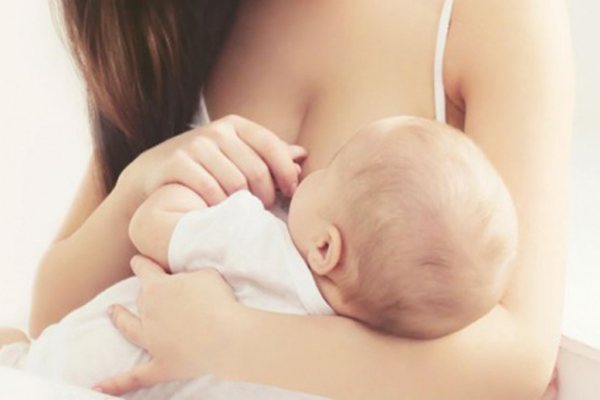
Modern neonatologists and pediatricians recommend not introducing complementary foods until the child reaches six months of age. Following these recommendations, the young mother will be in a state of lactational amenorrhea for the first 6 months of the child's life. However, we should not forget that each female body is individual, and babies also behave differently. Some children begin to refuse breastfeeding quite early, and some babies, although they nurse with pleasure, begin to increasingly skip night feedings, preferring to sleep soundly, without being distracted by food.
Normally, after the cessation of lactation, no more than 2 months should pass before the start of the menstrual cycle.
How to determine pregnancy while breastfeeding? Symptoms
The absence of menstruation after childbirth cannot be equated with the absence of ovulation. The mechanisms that occur in a woman’s body are so subtle that it is impossible to predict exactly when the ovaries will begin to function, releasing a new egg. There may be no monthly bleeding yet, but all functions of the female body are already beginning to function normally. Since ovulation occurs approximately two weeks before the start of the next cycle, you can only find out in advance about the body’s readiness for a new pregnancy using special tests.
Nature intends to provide the mother with a long enough recovery period so that at least a year passes between two pregnancies. However, at present, living conditions have changed greatly - the emergence of formulas, adapted baby purees, and the very rhythm of modern life often do not allow breast milk to be the main food for an infant up to one year old.
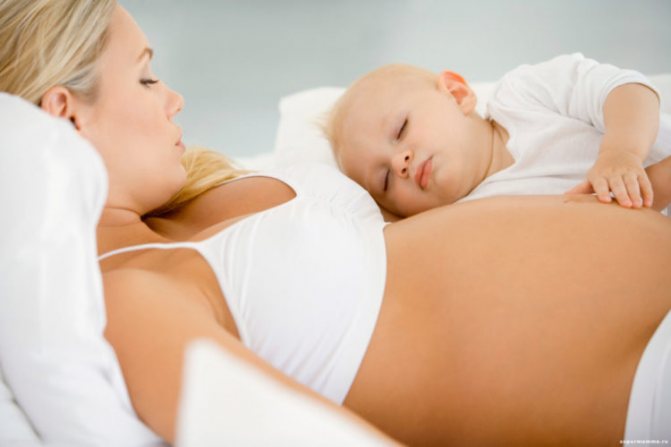
Therefore, sometimes the absence of a cycle means the birth of a new pregnancy
, which comes as a complete surprise to mommy. You can suspect another pregnancy due to symptoms such as:
- Toxicosis.
It can be expressed not only by severe nausea and vomiting, but also by heartburn, aversion to certain tastes and smells. - Severe, causeless gas formation in the evenings.
The abdomen looks enlarged and dense. This is especially noticeable in mothers who have carried more than one child, and if not much time has passed after childbirth, that is, the abdominal wall has not yet had time to strengthen. - Nagging pain in the lower abdomen.
This is the so-called hypertonicity of the uterus. During lactation, if the menstrual cycle has not been restored, the uterus is very calm and not painful. If you haven’t had menstruation yet, and your stomach feels strange, and this sign of pregnancy is more than one in a nursing mother, you should get examined. - Copious watery vaginal discharge.
With lactational amenorrhea (absence of a menstrual cycle during breastfeeding), there is no vaginal discharge at all... If suddenly they appear, then this is a reason to think that ovulation may have occurred, and after 2 weeks your period will begin (if pregnancy has not occurred). Or ovulation has already occurred, conception has occurred, and no critical days are expected for several more months. - Bloody vaginal discharge that appears only periodically and is too scanty to be considered a period.
If there are such signs of pregnancy during breastfeeding and the absence of menstruation, they can be regarded as a clear symptom of the threat of miscarriage. You need to see a doctor. Also, bleeding occurs with endometrial polyps, endometriosis, hyperplasia and other diseases of the uterus. They all require attention. - A stripe began to appear in the middle of the abdomen.
It is noticeable to those women whose stripe has already disappeared after the previous pregnancy. Although, sometimes it begins to appear a little even without pregnancy, in the second phase of the cycle, when the production of the hormone progesterone increases. - Slightly painful and frequent urination with a normal urine test.
Already in the first 2-3 weeks of pregnancy, mommy can visit the toilet up to five times at night. This is how progesterone acts on the bladder, relaxing it. - Increase in basal temperature.
During pregnancy, the temperature in the rectum exceeds 37 degrees. Out of illness. The temperature is measured rectally in the morning, before getting out of bed. - Another “pregnancy sign” is a change in the taste of milk . Because of this, some children refuse their usual diet.
- The appearance of acne.
Not just on the face. Many people experience red pimples on their back. - If a new pregnancy occurs, a change in hormonal levels will inevitably occur. Prolactin levels will decrease and progesterone levels will increase. For this reason, the amount of milk may decrease . The woman notes that her breasts are no longer full as they were before.
- Tingling in the ovarian area.
Usually on the side where ovulation occurred. A corpus luteum or corpus luteum cyst forms there, which sometimes causes such sensations. - Severe fatigue, drowsiness.
Very typical for the first trimester. Moreover, the fatigue is not motivated.
Read also…. Preparing a home for a newborn. Dowry list

If you experience more than one of these symptoms, take a pregnancy test. Even in the absence of pregnancy or “pregnant” symptoms, it is advisable for women who are sexually active during lactation with an unrestored menstrual cycle or irregular menstruation to have tests done once a month. After all, pregnancy without symptoms during breastfeeding is not uncommon.
Thus, the cycle after childbirth may not be established immediately. For most, the nature of the bleeding also changes - the cervix of a woman who has given birth opens faster and more painlessly. Sometimes the discharge becomes heavy; for some, menstruation begins immediately with heavy bleeding. But if a short break after the first menstruation is not an alarming signal, then a long absence of menstruation after childbirth requires a visit to a specialist.
Bleeding in the postpartum period

Postpartum bleeding, or lochia, is the cleansing of the wound surface that forms at the site of the separated membranes and placenta. They last throughout the entire period of restoration of the inner surface of the uterus.
At this time, the uterus is especially vulnerable to infection, so you should regularly change sanitary pads and monitor the nature of the discharge. They are maximally expressed within 3 days after birth, and then gradually weaken.
Sometimes such discharge completely stops within a day. This occurs due to the retention of blood in the uterine cavity (hematometra), which leads to an increased risk of infection. In this case, the help of a doctor is necessary.
Normally, cleansing the uterus after natural childbirth lasts from 30 to 45 days. After surgical delivery, this time may increase due to scar formation and longer healing.
How to distinguish menstruation from bleeding after childbirth?
Lochia gradually changes its character. By the end of the 1st week they become lighter, after 2 weeks they acquire a slimy character. Within a month, an admixture of blood may appear in them, but its amount is insignificant. Usually a woman easily distinguishes this process from menstruation. At least 2 weeks should pass between the cessation of lochia and the beginning of the first menstruation. If in doubt, it is better to consult a gynecologist or at least start using barrier contraception that protects the uterus from infections.
Postpartum period
Sometimes bleeding after childbirth can be confused with menstruation, but in reality it is not.
They are a natural process that occurs in the body of every woman, regardless of whether she gave birth independently or using the cesarean section method. Immediately after birth, about 300 ml of blood is lost. After the placenta is separated, wounds form on the surface of the uterus, which then bleed. This spotting is called lochia and can normally be observed up to 8 weeks after birth. At first they are intense, which gradually decreases and disappears as the uterus heals. How long have you been without periods and when should they start after childbirth? Let's consider three options:
- when a woman who has given birth does not breastfeed her child for various reasons, and he is completely bottle-fed;
- when a child simultaneously receives breastfeeding and is supplemented with formula and complementary foods, being on mixed feeding;
- when a newborn receives breast milk as the only food and drink, complementary foods are not introduced until 6-8 months and there is no additional water, in other words, he is breastfed.
Option 1. Artificial feeding
In this case, the restoration of the menstrual cycle occurs rapidly. The first menstruation can begin after the uterine mucosa has healed - when the release of lochia stops. On average, this process takes from 6 weeks and in very rare cases up to 4-5 months after birth.
All spotting that occurs after lochia should be perceived as normal menstruation, unless there are symptoms of uterine bleeding. The occurrence of such bleeding is rare, but is likely even several months after the birth of the child.
Pay attention to your body's signals, and if you have doubts about the causes of bleeding, consult a doctor immediately.
If you have not had your period for more than 4 months from the onset of childbirth, then you should be concerned and undergo a medical examination.
Read also:
Psychoses and neuroses in women after childbirth: causes, symptoms and diagnosis
Option 2. Mixed feeding
With this type of feeding, there is no menstruation from 3-4 months to a year after the baby is born. This variation in timing is associated with the moment when the mother stopped feeding at night and in the morning. It is during these hours that the hormone responsible for milk production and suppression of ovulation is produced, which results in menstruation. The later the new mother finishes feeding at this time of day, the longer she does not have menstruation.
Option 3: Breastfeeding
How long will there be no menstruation if the child is fed as nature intended, i.e. at any time of the day or night, upon request? And this is where the fun begins.
It could be 3-4 months, or a year, or even two! Experts have different opinions on this matter. But everyone agrees on one thing: the early onset of menstruation in this case is an individual characteristic of a woman’s body and her pituitary gland, responsible for the release of the “feeding” hormone, works in a special way.
Start of menstruation
There are no periods during pregnancy. This is a natural protective mechanism for preserving the fetus, which is regulated by hormones. After childbirth, the restoration of the woman’s normal hormonal status begins. It lasts for a month if breastfeeding is not started.
When should your period start after childbirth?
This period is determined primarily by the type of feeding the child: natural or artificial. Breast milk production occurs under the influence of the pituitary hormone prolactin. It is he who suppresses the growth of the egg in the ovary during lactation. The level of estrogen does not increase, therefore, when breastfeeding, menstruation begins, on average, 2 months after birth, more often when feeding “by the hour.”
For many young mothers, this period extends to six months or more, especially when feeding “on demand.” In very rare cases, while breastfeeding continues, even periodically, women note that they have not had periods for a year, and sometimes longer. In such cases, you need to regularly use contraception, and if necessary, take a pregnancy test. You should also consult your doctor to rule out hyperprolactinemia.
With artificial feeding from birth, the duration of the cycle is restored in a month to a month and a half. At this time, ovulation also occurs, so a new pregnancy is possible.
When a baby is fed only breast milk, the woman may not have menstruation all this time. In this case, the first menstruation after childbirth will begin during the first six months after the end of lactation “on demand” or the introduction of complementary foods. However, this is not necessary, and even during breastfeeding, menstruation may resume.
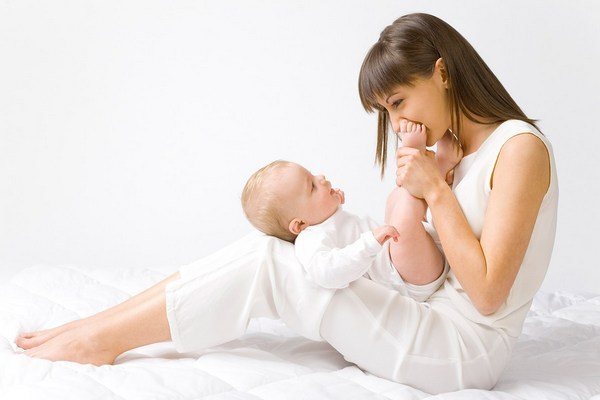
With mixed feeding (from a bottle and naturally), the restoration of menstruation develops faster, within 4 months after birth.
How long do periods last in the postpartum period?
Often the first menstruation is very heavy. There may be heavy discharge, periods with blood clots. If you have to change the pad every hour, you should seek help from a doctor: this may be a symptom of bleeding. Subsequent periods usually become normal.
In other cases, women experience irregular spotting in the first months. This is typical for breastfeeding, when prolactin synthesis gradually decreases.
Additional factors affecting the speed of restoration of the normal cycle:
- difficulties in caring for a child, lack of sleep, lack of help from relatives;
- unhealthy diet;
- postpartum depression;
- the mother is too young or has a late birth;
- concomitant diseases (diabetes, asthma and others), especially those requiring hormonal therapy;
- complications after childbirth, for example Sheehan syndrome.
When should menstruation come when breastfeeding?
There are no exact dates for the arrival of menstruation during this period. They largely depend on whether the woman follows the feeding schedule and whether she gives the newborn complementary foods. It is noted that reproductive function is restored much faster if the child is on a mixed diet, and not exclusively on breast milk.
With pure breastfeeding
Delayed menstruation during lactation is considered normal. The timing of menstruation in women breastfeeding depends on several factors. If a young mother puts her baby to her breast on demand and does not refuse feeding at night, then she may not experience menstruation for more than six months.

In those cases when the interval between feedings is strictly maintained, during the day the child receives breast milk every three or even four hours, and at night he may not eat for an even longer period, then reproductive function will be restored faster. The arrival of the regula after childbirth can be expected after 3–4.
With mixed feeding
If a child receives special formulas in addition to mother’s milk, then the appearance of menstruation after childbirth while breastfeeding can be expected after 2–3 months. The presence of complementary foods helps to reduce prolactin concentrations and quickly restore reproductive function. The timing of the appearance of the first menstruation is shorter than in the case of exclusive breastfeeding.
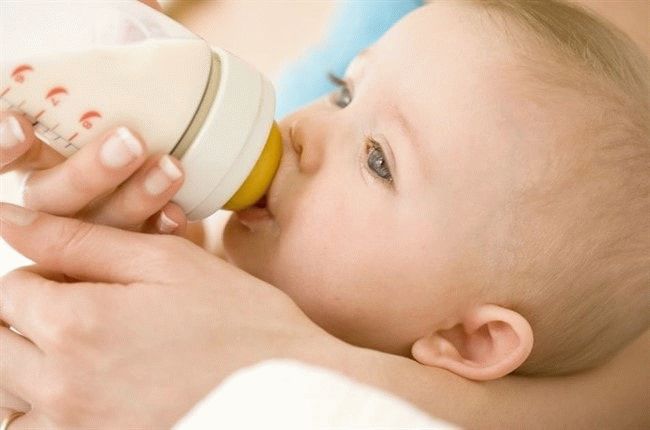
Menstrual cycle changes
Irregular periods often persist for several cycles after childbirth. These changes do not have to be permanent. Within 1-2 months, the cycle normally returns to prenatal characteristics or changes slightly in duration.
- Scanty periods can normally occur during the initial 2-3 cycles, especially if mixed feeding is used.
- During the first cycles after childbirth, on the contrary, some women experience heavy periods. This may be normal, but if menstruation does not become normal in the next cycle, you should consult a gynecologist.
- The regularity of menstrual flow is disrupted, that is, the cycle is disrupted.
- Painful periods may occur, even if the woman never complained of pain before pregnancy. The reason for this is infection, too much contraction of the uterine wall. In most cases, on the contrary, painful periods before pregnancy become normal. This is caused by the normalization of the location of the uterus in the body cavity.
- Some women develop premenstrual syndrome or its precursors: nausea, swelling, dizziness, emotional changes before menstruation.
Menstrual cycle during lactation
Breastfeeding has a huge impact on the monthly cycle. The hormone prolactin is responsible for successful lactation, which suppresses ovarian function, making ovulation difficult, if not completely impossible. This is how nature makes sure that a new pregnancy does not occur, and the mother is able to fully feed her newborn child. It follows from this that it is possible that menstruation will resume only after breastfeeding is completed. This condition is called lactational amenorrhea.
Postpartum amenorrhea during breastfeeding can last for two to three years. The duration of amenorrhea in nursing mothers may correspond to different periods, but in any case, the absence of menstruation is considered as a physiological disorder (that is, a disorder that is not painful and normal for the body within its natural state).
https://simptomer.ru/bolezni/zhenskie-zabolevaniya/302-amenoreya-simptomy#header5
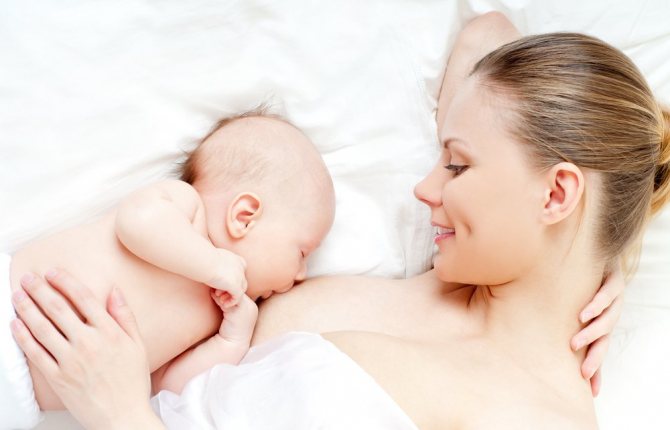
During breastfeeding, the hormone prolactin is released, which suppresses ovulation.
About three months after giving birth, when I was completely accustomed to the role of a mother, and life was gradually returning to normal, I began to worry that my periods were still not coming. Before giving birth, I never had any problems with my cycle, so the absence of even a hint of an approaching period really puzzled me. Since my doctor could not say anything specific about this, I went to one of the parenting forums and found out that while I was breastfeeding, almost any cycle or lack thereof would be considered normal (provided there is no severe pain, discomfort, suspicious discharge, fever etc.). I won’t say that this calmed me down very much, but I had a lot of worries with the baby and I simply didn’t have the strength to seriously worry about this. I took the information into account and plunged headlong into everyday chores. I breastfed for a year and nine months and never had a period during that time. Three weeks after weaning my son, my cycle returned. It became shorter by two days, but there were no problems with regularity.
Lactational amenorrhea - video
Quite often the cycle begins to recover when the baby reaches about six months of age. It is at this time that children who were exclusively breastfed begin to be introduced to complementary foods, the need for milk decreases and less prolactin is produced.
An irregular cycle during breastfeeding (breastfeeding) will be the norm rather than a pathology. The duration of periods can fluctuate within a few days, sometimes menstruation may not occur at all, and then return again in the next period. The discharge may differ from prenatal and be very insignificant (“smeared”). The cycle can be constant for a certain time, and then begin to change again. But if significant fluctuations (up to 5 days) continue after the end of the lactation period, you need to see a doctor.
Causes of postpartum menstrual changes
A delay in menstruation after childbirth appears under the influence of changing hormone levels:
- secretion of prolactin in the pituitary gland, which helps secrete breast milk and suppresses ovulation;
- suppression of estrogen production under the influence of prolactin, which leads to irregular menstruation or its complete absence during breastfeeding (lactational amenorrhea).
When a child feeds only on mother’s milk, and “on demand”, and not “by the clock”, and a woman does not have periods for six months after giving birth, this is the norm.
After the onset of menstruation, it is advisable to start using contraception. Although breastfeeding reduces your chances of conceiving, it is still possible. For example, if your period started after childbirth and then disappeared, the most likely reason for this is a repeat pregnancy. It should also be remembered that ovulation occurs before menstrual bleeding begins. Therefore, pregnancy is quite possible even before the first menstruation. If a woman is concerned about why she has not had menstrual bleeding for a long time, she must first take a home pregnancy test and then consult a gynecologist. You may need to consult an endocrinologist.
Read also…. How to make money while on maternity leave
You should not stop breastfeeding after your menstrual cycle appears. Menstruation does not change its quality. It happens that these days the child does not eat well, is capricious, and refuses to breastfeed. This is usually associated with emotional disturbances in a woman, her worries about the quality of feeding.
During menstrual bleeding, the sensitivity of the nipples may increase, and feeding becomes painful. To reduce such sensations, it is recommended that before giving the baby the breast, massage it, warm it, and apply a warm compress to the nipples. It is necessary to keep the chest and armpit area clean. During menstruation, the composition of sweat changes, and the baby smells it differently. This may be another reason for feeding difficulties.
Lack of menstruation in breastfeeding women - hormonal reasons
What are periods? This is a physiological phenomenon that accompanies the process of rejection of the uterine mucosa. It is believed that their occurrence is regulated by the hormonal system. In the first phase of the menstrual cycle (counted from the first day after the end of menstrual bleeding), which lasts on average two weeks, the follicle matures, after which it ruptures and an egg is released from it. The release of an egg from the follicle is called ovulation.
At the site of the ruptured follicle, a corpus luteum is formed, which produces hormones, including progesterone, the “pregnancy” hormone, for 10-12 days. If fertilization of the egg does not occur during this period, there is no implantation of it into the mucous membrane of the uterus, then the corpus luteum degenerates, the level of progesterone in the blood drops, and menstruation occurs. This is how the cyclical work of the endocrine system occurs.
What happens if you breastfeed? In this case, the pituitary gland produces the hormone prolactin, which is responsible for the production and quantity of milk. Prolactin blocks the synthesis of progesterone, which prevents follicle maturation, disrupts the menstrual cycle and prevents conception. After the birth of a baby, a woman needs the body’s resources to feed the newborn, and not for a new pregnancy. That's why my period doesn't come.
If you breastfeed your baby on demand, and especially at night and in the morning from 6-8 hours, then the level of prolactin is high enough to inhibit the onset of ovulation, and as a result, the restoration of the menstrual cycle. Even if the child is already over a year old and receives complementary foods.
Read also:
Short periods: causes, diagnosis, treatment
Previously, our grandmothers used this feature of the body as a reliable method of contraception. Now, due to the busy pace of life, stress, poor ecology, the natural hormonal program is experiencing disruptions, and during breastfeeding it is still better to protect yourself from unwanted pregnancy.
If breastfeeding is cancelled, the menstrual cycle is restored on average after two months.
Irregular periods

What to do if your menstrual cycle becomes irregular:
- In the first months of the postpartum recovery period, there is no need to panic. In most cases, this is the norm. For each woman, normalization of the cycle occurs individually, usually during the first months of the resumption of menstrual bleeding. Irregularity occurs more often in women who breastfeed.
- It takes about 2 months to restore the normal function of all organs and systems. Balance in the endocrine system occurs later, especially if breastfeeding is used. Therefore, a woman may feel quite healthy, but at the same time she will experience a lack of menstruation.
- You should pay attention to an irregular cycle only after 3 cycles. This may be due to an inflammatory process, endometriosis or a tumor of the genital organs. A delay in your second period is not dangerous unless it is associated with another pregnancy.
If you have any doubts, it is better to consult a gynecologist, get diagnosed in a timely manner and begin treatment.
A brief excursion into the history of breastfeeding in Rus'
“The mother carries the child in her womb for seven months and then feeds him with breast milk for forty forty (40 months),” an excerpt from the ancient Slavic calendar.
Moreover, at that time a week had 9 days, and a month had 40 or 41 days, depending on the parity. Breastfeeding lasted almost four and a half years! In that distant era, deprived of the Internet, medicine in its current understanding, specialized literature, all kinds of misconceptions and fears, breastfeeding was done at the first cry, cry, or demand of the child. There was even a respected and honorable profession, affectionately called “nurse.”
At that time, the value of breastfeeding was not discussed, and the baby’s mother could be with him all the time, enlisting the support of relatives and friends in everyday care of the home and family.
Read also:
Menstruation and bleeding - differences and characteristic signs
Of course, there were exceptions, and nurses came to the rescue. In extreme cases, artificial feeding with goat and cow milk was used. But it was considered a great shame for a mother if she could not feed the baby herself.
With such a natural course of childbirth, long-term feeding with mother's milk, the fact that a woman does not have menstruation did not cause surprise or worry. Usually they began a year or two after the birth of the child. And this was considered the norm.
Cycle after pathological pregnancy or childbirth
Menstruation does not return immediately after a missed pregnancy. Only some women experience regular bleeding within a month. In most cases, hormonal imbalance that led to termination of pregnancy causes cycle irregularity.
After termination of a frozen pregnancy or abortion, the first menstruation occurs within 45 days. If this does not happen, the woman should seek help from a gynecologist.
To exclude causes of amenorrhea, such as the remaining part of the fertilized egg in the uterus or inflammation, an ultrasound scan must be performed 10 days after the termination of a frozen or normal pregnancy.
The first menstrual flow after an ectopic pregnancy begins 25 to 40 days after its completion. If they start earlier, it is probably uterine bleeding, which requires seeing a doctor. A delay of more than 40 days also requires consultation with a gynecologist. If the disease has caused severe stress in a woman, the norm is to extend the recovery period to 2 months.
Menstruation after a cesarean section is restored in the same way as after a normal birth. During lactation, periods do not come for six months. With artificial feeding, there is no period for 3 months or even less. Both during physiological and during childbirth by cesarean section, in a small proportion of women the cycle is not restored within a year. If no other pathology is detected, this is considered normal.
In the first few months after a frozen pregnancy, intrauterine pregnancy, or cesarean section, your cycle may be irregular. Subsequently, its duration may change compared to the previous one. But normally it is no less than 21 days and no more than 35 days. Menstruation lasts from 3 to 7 days.
After all of the above situations, it is recommended to protect yourself from a new pregnancy for at least six months. It must be remembered that the absence of menstruation is not a sign of anovulation, and even before the first menstruation a woman can become pregnant.
Pathology of menstruation
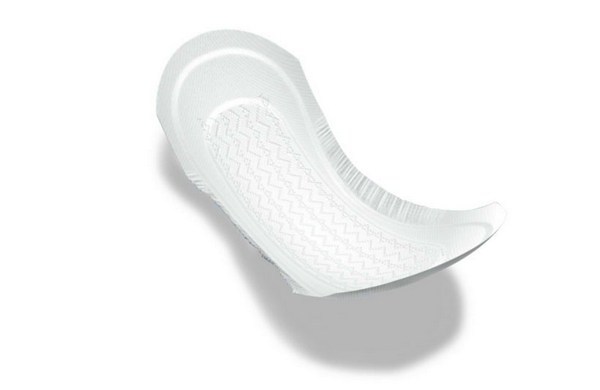
Sometimes bleeding that begins in a woman after childbirth is pathological. In this case, you should not wait several cycles for them to normalize, but immediately consult a doctor.
- A sudden cessation of postpartum discharge is a sign of a bent uterus or endometritis, an accumulation of lochia in the uterine cavity - lochiometra.
- Scanty periods for 3 cycles or more. Perhaps they are a symptom of hormonal disorders, Sheehan syndrome or endometritis.
- Irregularity of menstruation six months after its restoration, a break between bleeding for more than 3 months. Most often accompanied by ovarian pathology.
- Excessive bleeding for 2 or more cycles, especially after surgical delivery or termination of pregnancy. They are often caused by the tissues of the membranes remaining on the walls of the uterus.
- The duration of menstruation is more than a week, which is accompanied by weakness and dizziness.
- The appearance of abdominal pain, fever, unpleasant odor, change in color of vaginal discharge is a sign of a tumor or infection.
- Spotting before and after menstruation is a likely symptom of endometriosis or an inflammatory disease.
- Itching in the vagina, an admixture of cheesy discharge is a sign of candidiasis.
- Bleeding twice a month, persisting for more than 3 cycles.
In all of the above cases, the help of a gynecologist is needed.
Sometimes, despite a woman’s apparent health, her menstruation does not occur at the right time. This may be a symptom of a childbirth complication - Sheehan syndrome. It occurs when there is heavy bleeding during childbirth, during which blood pressure drops sharply. As a result, the cells of the pituitary gland, the main organ regulating the function of the reproductive system, die.
The first sign of this disease is the absence of postpartum lactation. Normally, in the absence of milk, menstruation appears after 1.5-2 months. However, with Sheehan syndrome, a deficiency of gonadotropic hormones occurs. The maturation of the egg in the ovary is disrupted, there is no ovulation, and there are no menstrual bleeding. Therefore, if a woman who has given birth does not have milk, and then her cycle does not recover, she urgently needs to consult a doctor. The consequences of Sheehan syndrome are adrenal insufficiency, which is accompanied by frequent infectious diseases and a general decrease in the body's resistance to various stresses.
There is also the opposite problem - hyperprolactinemia. This condition is caused by increased production of prolactin in the pituitary gland after the end of lactation. This hormone inhibits the development of the egg, causes anovulation, and disrupts the normal thickening of the endometrium in the first phase of the cycle. Its excess leads to the absence of menstruation against the background of ongoing milk synthesis.
The main causes of hyperprolactinemia are pituitary adenoma, gynecological diseases, and polycystic ovaries.
Recommendations for normalizing your cycle
When a woman is healthy, her cycle returns normally. To avoid possible failures, you need to follow some simple recommendations:
- To give the body the opportunity to quickly restore the synthesis of hormones, you need to eat well. Plenty of fruits, vegetables, whole grains and water, combined with regular exercise, is an effective method of restoring hormonal balance. The menu should include dairy products, cottage cheese, and meat. After consulting with your doctor, you can take multivitamins for nursing mothers.
- Do not take birth control pills. They can change hormonal levels and cause unpredictable changes in the cycle. If a woman is sexually active, it is better for her to use condoms or other non-hormonal methods of contraception.
- Organize your routine as efficiently as possible. If your baby doesn't sleep well at night, you should try to get enough sleep during the day. You should not refuse any help from your loved ones. A woman's good physical condition will help her recover faster.
- If you have chronic diseases (diabetes, thyroid pathology, anemia and others), you need to visit an appropriate specialist and adjust your treatment.
